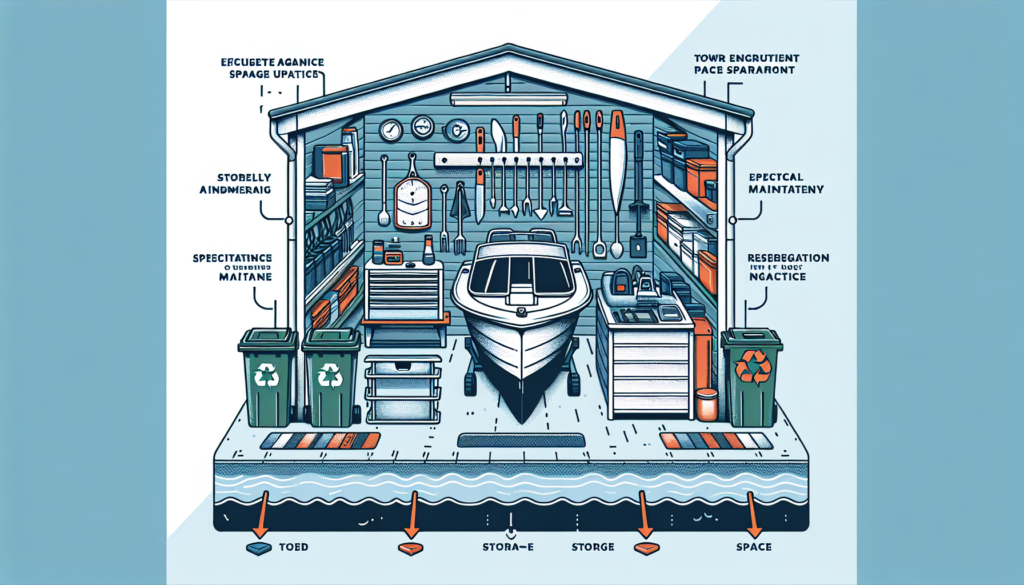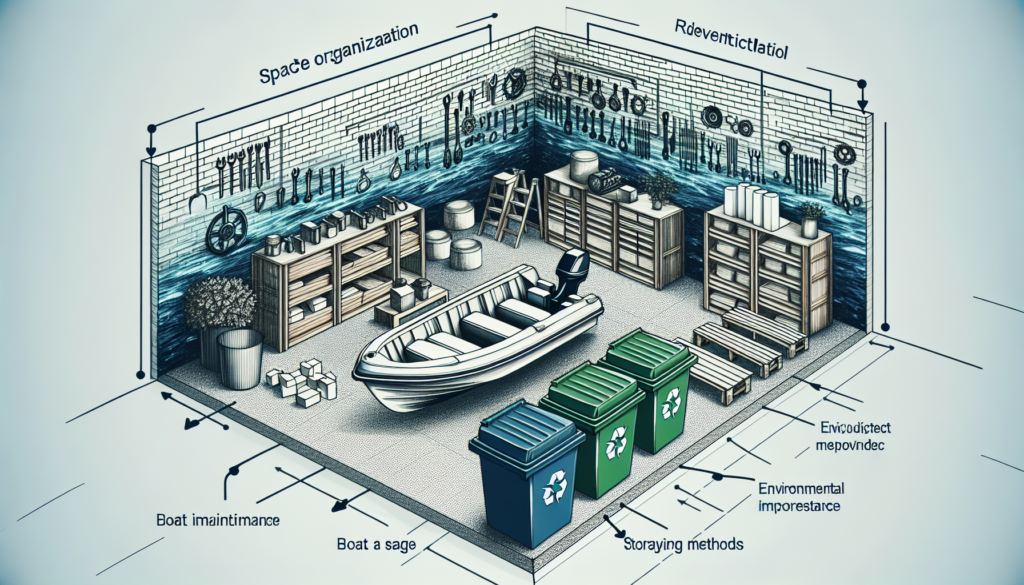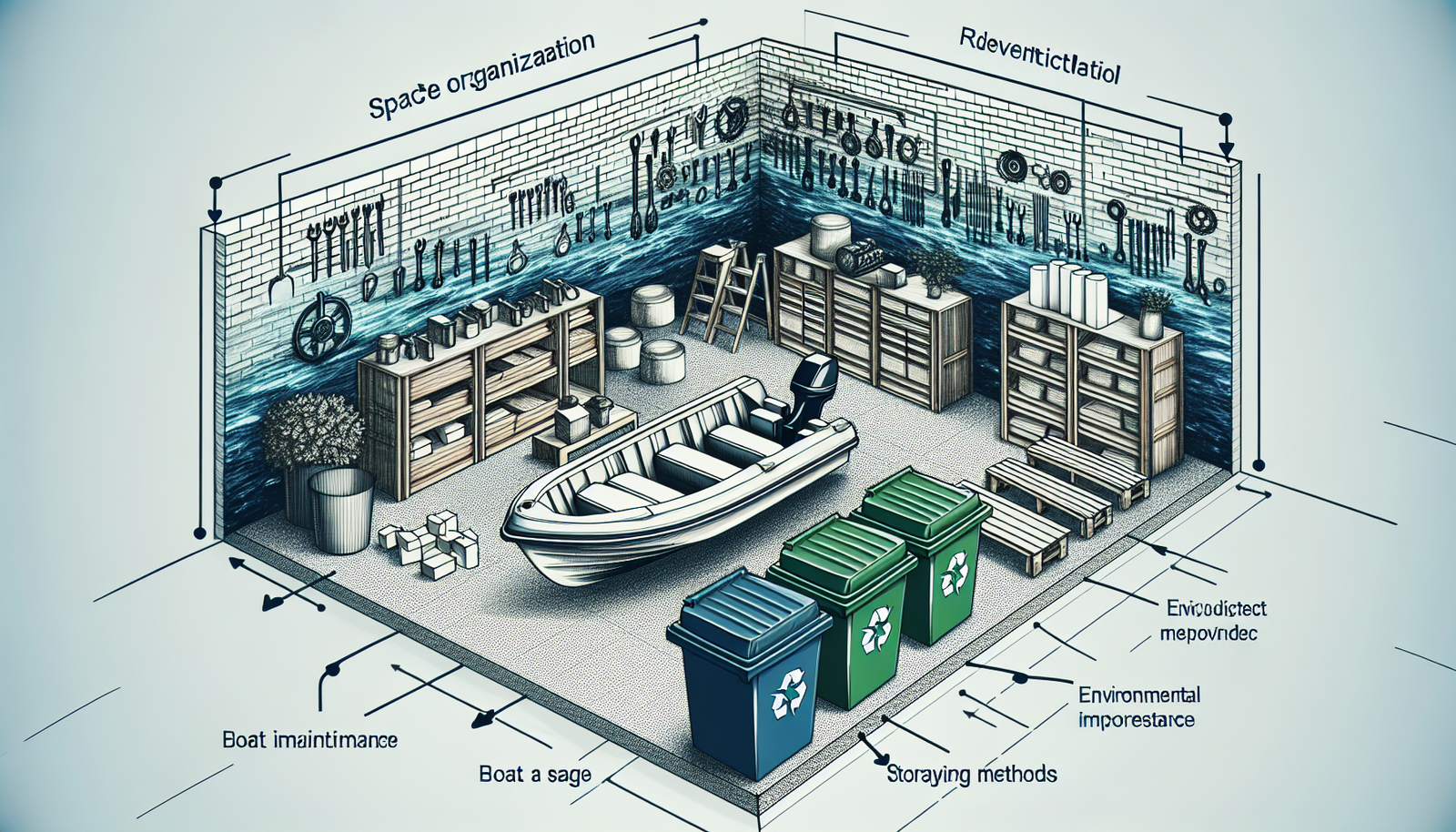Whether you’re an avid boater or have just begun your seafaring adventures, you know the importance of keeping your boat engine in top shape. A well-maintained engine ensures you can enjoy countless sunsets on the water, while also playing a pivotal role in the conservation of aquatic ecosystems. The guide titled “Minimizing the Footprint of Boat Engine Maintenance and Storage” provides valuable tips and suggestions to help you effectively reduce your impact on the environment. It’s all about creating a balance between your love for boating and nature preservation. From managing oil leakages to suitable storage solutions, you can learn how to undertake boat engine maintenance in an eco-friendly way. So ready to power up your boat engine while also contributing to a greener planet? This guide has got your back!

Understanding Boat Engine Maintenance
When it comes to owning a boat, one of the most important tasks you’re responsible for is boat engine maintenance. Understanding how to properly maintain your boat engine can improve its longevity, enhance its performance, and save you from expensive repairs down the line.
Fundamentals of boat engine upkeep
Regular boat engine upkeep is all about staying ahead of problems before they become significant. You should familiarize yourself with key parts like spark plugs, fuel filters, and belts, understanding how they work and when they should be replaced. Keep an eye out for signs of wear and tear such as corrosion or leaks, and take action as soon as you notice an issue.
Importance of regular maintenance
Regular maintenance of your boat engine is essential in enhancing its lifespan and reliability, reducing the risk of sudden breakdowns when you’re out on the water. Regularly scheduled upkeep can reveal minor issues and stop them from spiraling into expensive repairs.
Key considerations in boat engine care
When taking care of your boat engine, it’s essential to keep the engine clean, lubricate the moving parts, check fluid levels, and inspect the propeller for any damages. Always refer to your boat engine’s manual for specific maintenance schedules and procedures while observing safety measures.
Green Practices in Boat Engine Maintenance
In the modern world, eco-friendly practices are paramount in all sectors of life, and boat engine maintenance is no exception. Here’s how you can go green with your boat maintenance routine.
Adopting eco-friendly products
Switching to eco-friendly maintenance products is a straightforward way to reduce environmental impact. Look for non-toxic, biodegradable cleaning supplies and lubricants that don’t contribute to water pollution.
Responsible disposal of used engine oil
Don’t just pour old engine oil down the drain. Arrange to recycle it at a local facility or with a waste collector who accepts used oil. By doing this, you prevent contamination of soils and water sources.
Minimizing water pollution during maintenance
Try to minimize spillages when changing oil or antifreeze and ensure that runoff from cleaning your boat doesn’t end up in the water system. Always work in a location where you can manage spills effectively, and never wash your boat in the water.

Efficient Use of Maintenance Tools and Equipment
Efficient use of maintenance tools and equipment is central to boat engine upkeep.
Reduction of tool wastage
Using the wrong tool for the job or misusing tools can lead to damage and wastage. Make sure you’re using the right tool for each task, and use it correctly to lengthen its lifespan.
Proper maintenance of tools
Just as you maintain your boat engine, so too should you maintain your tools. Keep them clean and rust-free, lubricate moving parts, and store them properly to avoid damage and ensure they’re always ready to use.
Repurposing and recycling of old equipment
When the time comes to replace a tool or piece of equipment, consider whether it could be repurposed rather than thrown out. If not, make sure you recycle it responsibly.
Fuel-Efficient Boat Engines
Fuel efficiency is a hot topic, and for good reason. An energy-efficient boat engine saves you money, reduces environmental impact, and minimizes the need for refueling stops.
Selecting energy-efficient engines
When looking to buy a new boat or replace an old engine, fuel efficiency should be a pivotal consideration. Modern engines are designed to deliver more power with less fuel. Opting for one of these engines can significantly lower your fuel bills and environmental impact.
Fuel-saving practices
Adopting fuel-saving practices could help you maximize efficiency. Slow down instead of going full speed, stay on top of engine maintenance, and plan your trips efficiently to prevent unnecessary fuel consumption.
Understanding engine fuel consumption
Understanding how much fuel your engine consumes not only makes for better budgeting but also allows you to ascertain how your boat affects the environment. With this knowledge, you can make informed decisions about the type of engine to use or the best cruising speed.

Reducing Air Pollution from Boat Engines
While much attention is paid to car emissions, boat engines also contribute a significant amount of air pollution. Here’s what you should know to minimize your impact.
Understanding engine emissions
Most boat engines run on gasoline or diesel, both of which produce harmful emissions when burned, including carbon monoxide, sulfur oxides, and particulate matter. These pollutants contribute to air pollution and climate change, highlighting the need for clean boating practices.
Implications of boat engine pollution
Boat engine pollution has a direct impact on air quality and contributes to the greenhouse effect, global warming, and human health issues such as respiratory illnesses. minimizing these emissions can make boating more sustainable and protect our health and that of the planet.
Technologies to reduce air pollution
Modern technologies, such as direct fuel injection systems and four-stroke engines, can help reduce air pollution from boat engines. Consider upgrading to a cleaner model if your current engine is old and inefficient.
Boat Engine Storage Solutions
When it’s time to dock your boat for a while, proper engine storage is vital for performance and durability.
Crucial factors in proper boat engine storage
Proper storage requires cleaning, winterizing, covering, and occasionally running the boat to keep the engine in optimal condition. These steps prevent decay and rust, keeping your boat ready for the next season.
Environmentally-friendly storage facilities
When selecting a storage facility, consider the environmental impact. Facilities with solar panels, energy-efficient lighting, and good waste management policies are a far better choice for the planet.
Space-saving storage techniques
Storing a boat engine can take up a lot of room, but with good planning and the right techniques, you can save plenty of space. Consider vertical storage solutions and using spaces efficiently.

Minimizing Physical Footprint of Boat Engine Storage
The physical footprint of your boat engine storage matters, and reducing it can save space and reduce environmental impact.
Optimal arrangement of boat engines
The arrangement of your boat engines in storage can hugely impact the space used. Plan to position your boats in a way that optimizes space utilization.
Maximizing storage space
In addition to choosing the optimal arrangement, consider maximizing your storage space by utilizing wall and ceiling-mounted storage solutions. Additionally, avoid storing unnecessary items that take up valuable storage space.
Innovative storage solutions
Innovative storage solutions like hydraulic lifts or sliding rack systems allow you to store more boats in less space. As a bonus, these systems can make moving and accessing your boats easier.
Reducing Environmental Impact of Boat Engine Storage
Your boat engine storage can have environmental implications. Here’s how you can lower your impact.
Energy-efficient storage facilities
Consider moving to a storage facility with green credentials. These could include energy-efficient heating and lighting systems, renewable energy sources, and efficient insulation.
Non-toxic storage materials
Choose storage materials that are non-toxic and safe for the environment. Opt for biodegradable or recyclable materials wherever possible.
Recycling and waste reduction in storage
Promote recycling and reduce waste in your storage practices. You can achieve this by having a recycling system in place or by choosing a facility that already has one.
Safe and Sustainable Disposal of Old Boat Engines
The disposal of old boat engines is a vital part of boat ownership. Here’s how to do it sustainably.
Recognizing the end of engine life
A boat engine that requires constant repairs and still doesn’t perform well may be due for replacement. Watch for signs of end-of-life, such as poor performance, higher oil consumption, frequent breakdowns, and excess noise or smoke.
Options for recycling or repurposing old engines
Recycling is the best option for disposing of an old boat engine. Some parts like aluminum and steel can be easily recycled. Alternatively, you could repurpose the engine into a piece of art or a unique piece of furniture.
Eco-friendly disposal methods
Consider eco-friendly disposal methods when you can’t recycle or repurpose. Many boat dealers and marinas offer boat recycling programs that ensure that your old boat engine doesn’t end up in a landfill.
Best Practices in Eco-Friendly Boat Engine Maintenance and Storage
Bringing all these practices together can help minimize the footprint of boat engine maintenance and storage.
Incorporating sustainability in maintenance routines
Aim to incorporate sustainability into your maintenance routines from the start. Choose green products, recycle waste, and keep up with maintenance to keep your boat running efficiently for longer.
Green initiatives in engine storage
Likewise, when storing your boat, consider environmentally-friendly practices. Opt for green storage facilities, utilize space efficiently, and use eco-friendly storage materials.
Case studies of successful minimization of maintenance and storage footprint
Finally, consider learning from other boat owners who’ve successfully minimized their environmental footprint. Case studies can offer valuable insights and proven strategies to make your boat maintenance and storage more sustainable.
In conclusion, adopting an eco-friendly approach to boat engine maintenance and storage requires a little more effort and thought, but the benefits are worth it. You’ll not only keep your boat in the best possible shape, but also contribute to a healthier planet.

